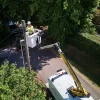ISPs Raise Concern Over Automatic Compensation for Broadband Faults
Ofcom’s proposal to give residential and small business consumers in the United Kingdom an automatic right to compensation from their broadband, phone or mobile provider when things go wrong (here), such as due to a “loss or reduction of service“, has drawn widespread concern from ISPs.
At present providers are not required to compensate residential customers for service faults, although some will occasionally credit for such problems and others may only pay out following a lengthy complaint process. Meanwhile those taking a proper business service should ideally be covered by a Service Level Agreement (SLA) that will usually pay out compensation, although related packages are often much more expensive.
Advertisement
Due to this the regulator has proposed to improve the current approach by adopting an automatic system of compensation, which they claim would be fairer for consumers and may provide “incentives for providers to improve service quality.” But the initial feedback from ISPs to Ofcom’s consultation highlights a plethora of concerns and we’ve summarised a few of those below.
Both Three UK and Vodafone are quick to warn that it would be very difficult to extend such a system to Mobile networks because of the many different variables involved in delivering both indoor and outdoor mobile reception, where a customer may often lose signal / service while moving around due to a variety reasons (e.g. going underground or passing through a notspot).
The trouble, they say, is often with identifying the cause in the first place and establishing who is actually at fault (e.g. if somebody suffers a dropped call, without realising that the other end of that call simply hung-up). “It is identifying these impacts that is at best difficult and at worst impossible without having the end-user initiate the discussion,” said Vodafone. The operator also touched on the issue of quality versus incentives.
Vodafone said:
Ofcom also assumes that automatic compensation would further incentivise service providers to improve service quality. On the contrary, it is also plausible that if the cost of implementing the regime is high, service providers my have to sacrifice service quality in order to invest in compliance measures.
Further, excessive cost of implementation/identifying root cause of each fault would lead to price rises to ultimately fund the costs of compliance. Whereas leaving quality of service to market forces in a competitive mobile environment both permits innovation to improve services and drives down prices.”
Meanwhile SSE, which also offers a fixed line broadband and phone service, suggested that the compensation should come from the party at fault, which for example would effectively shift the responsibility to Openreach (BT) or whoever is operating the underlying infrastructure (assuming that’s the part of the network that’s actually at fault). The UK Internet Service Providers Association (ISPA) and AAISP similarly suggested that Ofcom should take a close look at this aspect.
Advertisement
SSE said:
“It is totally unacceptable to design a compensation system for network and wholesale issues that does not directly entail network and wholesale CPs having to pay out the principal compensation amounts. This would undermine the incentive properties of the compensation system and lead to a distortion of retail competition in the market.
It is unrealistic to expect retail-only CPs to negotiate successfully with large upstream wholesalers holding Significant Market Power, such as Openreach. While large retail CPs might have more success, smaller ones would not and could suffer significant financial harm as a result of the framework that Ofcom has initially proposed..”
AAISP said:
“It is crucial that carriers that are responsible for back-haul and broadband circuits — the suppliers to many ISPs — have the same definition of faults and provide at least the same levels of compensation to the ISPs to pass on to end users.”
Naturally BT Group’s response disagreed with the above, which perhaps highlights the difficult position of being both the country’s largest ISP and its largest network supplier to third-party ISPs via Openreach.
Ofcom has already said that the compensation arrangements between wholesale and retail providers may need to be reviewed, although so far the regulator appears to be taking a hands-off approach to this aspect.
BT said:
“The question of whether retail CPs receive commercially-negotiated redress payments from their suppliers when things go wrong does not need to be considered by Ofcom in the context of a consultation on consumer compensation. The relationship between a retailer and its wholesale suppliers, and the commercial arrangements between them, whether the latter are regulated or not, is an entirely separate matter to the relationship between the retailer and its end customers.
Openreach is by no means the only wholesale supplier to retail CPs, and it would be massively complex if Ofcom were to attempt to ensure a correlation between the amounts of compensation that may or may not be received by retail CPs through commercial negotiation with suppliers, and the terms on which those retail CPs choose to offer compensation to their end customers.”
All of the respondents also called for more clarity from Ofcom on precisely what would or would not constitute a fault that could attract compensation, especially since many faults won’t have been caused by the ISP itself. On this point Ofcom has already indicated that not all problems will be applicable for compensation and those that are must lend themselves to being “objectively defined and measured.”
In other words, Internet outages caused by a serious remote cable break might well be applicable, but slower than expected broadband speeds probably wouldn’t. Likewise the regulator has indicated that compensation “may not be suitable where resolving a service issue may require long term network investment” (that’s a pretty big catch-all if you think about it generally).
Advertisement
Elsewhere the ISPA suggested that compensation should not take the form of a financial payment. Instead they proposed that it could come from reductions to a customer’s bill “as this would be a more straightforward and efficient process,” while Gigaclear echoed support for this idea and proposed that it come in the form of “service credits“.
The ISPA also proposed that the amount of compensation must be capped to prevent it from resulting in higher prices for everybody or discouraging investment in the building of new networks.
The ISPA said:
“ISPA would highlight that increased competition within the UK over the last 10 years has improved consumer choice and reduced prices, resulting in very low broadband prices, some of the lowest throughout Europe. While we agree with Ofcom about the importance of broadband in everyday life, we would suggest that any compensation should be within reason.
If ISPs are forced to pay large amounts of compensation, they will need to make up for the financial shortfall elsewhere, with the likely result higher prices for consumers. We would suggest that there should be a cap on any compensation that can be awarded, similar to the cap offered in the event of an electricity power cut.”
Meanwhile Gigaclear pointed out that the new system could create a potential conflict with Ofcom’s existing Alternative Dispute Resolution (ADR) process, where unresolved consumer complaints can be handed to an independent ombudsman. This can result in heavy costs for the ISP regardless of whether they win or lose the case, which is a problem that could be exasperated by the proposed compensation scheme.
Gigaclear also suggested that compensation should be “automatic where fault fixing is delayed beyond what is reasonable and where service quality is regularly below advertised levels, as long as the source of the problem can be identified as within the provider’s (or their wholesale supplier’s) control, measured and audited independently.”
Suffice to say that Ofcom appear to face a minefield of challenges in delivering the proposed system, not least with the problem of defining relevant faults, identifying responsibility for those faults and then distributing compensation without causing all consumers to pay significantly higher prices for their service. Separately Entanet has added a few related thoughts on its blog.
You can see a full summary of the ISP feedback below and Ofcom aims to set out their proposed approach by the end of 2016.
Consultation Responses (Ofcom’s Call for Input)
Mark is a professional technology writer, IT consultant and computer engineer from Dorset (England), he also founded ISPreview in 1999 and enjoys analysing the latest telecoms and broadband developments. Find me on X (Twitter), Mastodon, Facebook, BlueSky, Threads.net and Linkedin.
« Cisco Make Progress on 10Gbps Uploads for Cable Broadband Networks

















































Comments are closed